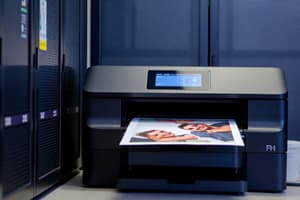Podcast
Questions and Answers
What is a characteristic of a network-attached printer with a single shared print server?
What is a characteristic of a network-attached printer with a single shared print server?
- It does not require any installation software.
- It can be accessed by multiple clients simultaneously. (correct)
- It connects to a local computer only.
- It has multiple print servers.
Which of the following hardware upgrades might be necessary for supporting heavy printer use?
Which of the following hardware upgrades might be necessary for supporting heavy printer use?
- Using a less complex driver.
- Adding additional system memory. (correct)
- Increasing network bandwidth.
- Deploying a more powerful printer.
What is the first step in installing a USB printer on a Windows system?
What is the first step in installing a USB printer on a Windows system?
- Manually configure the printer settings.
- Connect the printer and power it up. (correct)
- Use the control panel to add a new printer.
- Download the driver from the printer manufacturer's website.
What can be managed if clients have the proper permissions for a shared printer?
What can be managed if clients have the proper permissions for a shared printer?
Which scenario requires the use of the Additional Drivers dialog box on Windows Server 2012 R2?
Which scenario requires the use of the Additional Drivers dialog box on Windows Server 2012 R2?
What is the role of a print server in the Windows printing architecture?
What is the role of a print server in the Windows printing architecture?
What must be specified when installing a printer in Windows?
What must be specified when installing a printer in Windows?
Which of the following options is NOT a role performed by components in the Windows Print Architecture?
Which of the following options is NOT a role performed by components in the Windows Print Architecture?
Which configuration allows multiple users to share one printer directly attached to a single computer?
Which configuration allows multiple users to share one printer directly attached to a single computer?
What is the primary function of a printer driver in the printing process?
What is the primary function of a printer driver in the printing process?
What permission allows a user to print documents?
What permission allows a user to print documents?
Which group is assigned the default permission to manage this printer?
Which group is assigned the default permission to manage this printer?
What does the 'Manage Documents' permission allow users to do?
What does the 'Manage Documents' permission allow users to do?
What is the capability of 'Cancel all documents'?
What is the capability of 'Cancel all documents'?
What basic permission allows users to pause documents they own?
What basic permission allows users to pause documents they own?
Which capability is associated with Advanced Permissions for managing printers?
Which capability is associated with Advanced Permissions for managing printers?
What action is NOT included in managing documents?
What action is NOT included in managing documents?
What capability is granted to all users by default concerning their own documents?
What capability is granted to all users by default concerning their own documents?
What permission allows the user to change printer permissions?
What permission allows the user to change printer permissions?
What is the purpose of setting printer priorities?
What is the purpose of setting printer priorities?
A print server is responsible for receiving print jobs and sending them to print devices.
A print server is responsible for receiving print jobs and sending them to print devices.
Direct printing and network-attached printing are the only configurations used in Windows printing.
Direct printing and network-attached printing are the only configurations used in Windows printing.
The printer driver converts print jobs into commands for the printer.
The printer driver converts print jobs into commands for the printer.
A printer is considered the actual hardware that produces printed documents.
A printer is considered the actual hardware that produces printed documents.
A single computer can perform all roles in the Windows printing architecture except the print device.
A single computer can perform all roles in the Windows printing architecture except the print device.
A network-attached printer generally has a single shared print server.
A network-attached printer generally has a single shared print server.
To support heavy printer use, additional disk space for queued print jobs might be required.
To support heavy printer use, additional disk space for queued print jobs might be required.
Windows Server 2012 R2 can use different drivers for client workstations, such as 64-bit and 32-bit drivers.
Windows Server 2012 R2 can use different drivers for client workstations, such as 64-bit and 32-bit drivers.
A locally attached printer can only be shared during its installation.
A locally attached printer can only be shared during its installation.
Clients need proper permissions to access a shared printer.
Clients need proper permissions to access a shared printer.
Everyone has the capability to share a printer.
Everyone has the capability to share a printer.
Users with Manage Documents permission can control other users' print jobs.
Users with Manage Documents permission can control other users' print jobs.
By default, users can only manage documents they own.
By default, users can only manage documents they own.
The Cancel all documents capability is available to all users.
The Cancel all documents capability is available to all users.
The capability to delete a printer is granted by default to Everyone.
The capability to delete a printer is granted by default to Everyone.
Users must have Read Permissions to manage printers.
Users must have Read Permissions to manage printers.
Changing printer properties is part of the basic printer permissions.
Changing printer properties is part of the basic printer permissions.
Setting printer priorities allows certain users' print jobs to take precedence.
Setting printer priorities allows certain users' print jobs to take precedence.
The Take Ownership permission enables a user to manage their own documents only.
The Take Ownership permission enables a user to manage their own documents only.
Users can resume their own print jobs by default.
Users can resume their own print jobs by default.
Flashcards
Print Device
Print Device
The physical hardware that creates printed documents on paper or other media like labels.
Printer
Printer
The software that allows a computer to communicate with a print device. It acts as a translator between your computer and the printer.
Print Server
Print Server
A dedicated computer or network device that receives print jobs from client computers and sends them to connected printers.
Printer Driver
Printer Driver
Signup and view all the flashcards
Direct Printing
Direct Printing
Signup and view all the flashcards
Locally attached printer
Locally attached printer
Signup and view all the flashcards
Locally attached printer sharing
Locally attached printer sharing
Signup and view all the flashcards
Network-attached printer
Network-attached printer
Signup and view all the flashcards
Network-attached printer sharing with a single print server
Network-attached printer sharing with a single print server
Signup and view all the flashcards
Configuring printer security
Configuring printer security
Signup and view all the flashcards
Manage Documents Permission
Manage Documents Permission
Signup and view all the flashcards
Printing Permission
Printing Permission
Signup and view all the flashcards
Manage Printer Permission
Manage Printer Permission
Signup and view all the flashcards
Print Permission
Print Permission
Signup and view all the flashcards
Security Tab
Security Tab
Signup and view all the flashcards
Default Document Management
Default Document Management
Signup and view all the flashcards
Printer Priorities
Printer Priorities
Signup and view all the flashcards
Print Queue Window
Print Queue Window
Signup and view all the flashcards
Read Permissions
Read Permissions
Signup and view all the flashcards
Change Permissions
Change Permissions
Signup and view all the flashcards
What is a print server?
What is a print server?
Signup and view all the flashcards
What is a printer?
What is a printer?
Signup and view all the flashcards
What is a printer driver?
What is a printer driver?
Signup and view all the flashcards
What is a print device?
What is a print device?
Signup and view all the flashcards
How flexible is Windows printing?
How flexible is Windows printing?
Signup and view all the flashcards
Special Identity
Special Identity
Signup and view all the flashcards
Print and Manage Own Documents
Print and Manage Own Documents
Signup and view all the flashcards
Share Printer
Share Printer
Signup and view all the flashcards
Change Printer Properties
Change Printer Properties
Signup and view all the flashcards
Delete Printer
Delete Printer
Signup and view all the flashcards
Control Job Settings for Others
Control Job Settings for Others
Signup and view all the flashcards
Setting Printer Priorities
Setting Printer Priorities
Signup and view all the flashcards
Study Notes
Overview of Print and Document Services
- Print and Document Services are configured and deployed.
- A print server is deployed.
- The print and document services role is used.
Windows Print Architecture
- Print device: The physical hardware that prints documents.
- Printer: The software that controls communication between a computer and a print device.
- Print server: A computer or device that receives print jobs and sends them to print devices. It can be local or on the network.
- Printer driver: Software that translates print jobs into instructions for a specific printer.
Windows Printing
- Printer Installation: Select the printer device's manufacturer and model. Specify the port or interface. Install the printer driver for that specific device.
- Windows Printing Flexibility: A computer can handle all print components and the components can be distributed on a network.
- Four configurations: Direct Printing, Locally Attached Printer Sharing, Network-Attached Printing, and Network-Attached Printer Sharing.
Sharing a Printer
- Heavy use can require hardware upgrades (additional memory or disk space).
- A dedicated print server is an option.
- Shared print installation can be done during or after the initial installation.
- USB: Drivers install automatically upon connection.
- Network: Install software created by the printer's manufacturer.
- A printer can be shared during installation or after.
- When sharing a printer, users may need different drivers for different versions of Windows. Additional drivers can be installed.
Managing Printer Drivers
- Drivers on Windows Server 2012 R2 are often the same used on client workstations.
- Install different drivers using the Additional Drivers dialog, e.g., 32-bit versus 64-bit, for older operating systems.
- Drivers and their specifications are managed.
Configuring Printer Security
- Clients need appropriate permissions to access shared printers.
- Security is simpler than NTFS permissions
- Use the printer (access).
- Manage documents submitted to it.
- Manage printer properties.
- Printer permissions are managed like folder shares.
Basic Printer Permissions
- Print: Connect to the printer, print, pause, resume, restart, cancel user's documents.
- Manage this printer: Cancel all documents, share, change printer properties, delete a printer, and change printer permissions.
- Manage documents: Pause, resume, restart, cancel all user documents, and control job settings.
Managing Documents
- Users can usually print and manage their documents by default.
- Permission controls user's management of other's documents; enabling various actions (pause, resume, restart, cancel).
Managing Printers
- Tasks include setting priorities among multiple printers to the same device.
- Schedule printer access with different schedules for availability.
- Create printer pools to increase throughput and fault tolerance by connecting one printer to multiple print devices.
- Setting printer priority and scheduling printer access are possible tasks. Creating printer pools to manage multiple printers to a single print device enhances efficiency and fault tolerance.
Using the Print and Document Services Role
- The Windows Server 2012 R2 default installation makes printer sharing and management available.
- For network printing management, including installing print and document services, the function offers additional management capabilities.
Print Services Role
- Print Server: Primary Print Management console; required.
- Distributed Scan Server: Allows networked scanners to send documents to users.
- Internet Printing: Enables internet users to print to shared Windows printers.
- LPD Service: Allows UNIX clients to print to Windows.
- The print service role includes four services: Print Server, Distributed Scan Server, Internet Printing and LPD service, each having its own function within the system.
Using the Print Management Console
- Allows managing and configuring print components. Includes components like custom filters, print servers, and deployed printers.
- Windows users can manage print systems via a GUI (Graphical User Interface).
Adding Print Servers
- A GUI to deploy, configure, modify, and remove print servers.
- The process for adding print servers is carried out through a GUI.
Viewing Printers
- Administrators must track many printers, especially on large networks.
- The Print Management console provides filters to help manage large lists (including default filters), and add custom filters.
- The console has features to filter printers displayed to simplify management.
Managing Printers and Print Servers
- Offers the ability using the print management console GUI to access printer settings. A wide view of printer properties is shown, including status and print jobs.
- The console provides detailed information regarding printers.
Deploying Printers with Group Policy
- AD DS simplifies printer deployment to multiple clients.
- Administrators can locate printers by name, location, or model from the AD DS database.
- GPO allows linking printers to a domain, site, or OU.
- Group Policy Objects are configurable for printer deployment.
Studying That Suits You
Use AI to generate personalized quizzes and flashcards to suit your learning preferences.




